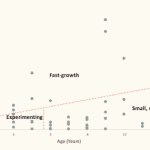An Emerging Cornerstone of Last-Mile Distribution: The Power of Data and Process Digitalization
Social enterprises at the last-mile are working relentlessly to close the gap in achieving the Sustainable Development Goals (SDGs). This challenge is quite arduous, as people in need of greater access to essential products and services related to health (SDG 3), water and sanitation (SDG 6) or energy (SDG 7) are often the most underprivileged – and thus often the most sensitive to a product’s price. Given this limitation, organizational cost-efficiency is the primary variable affecting the profitability of these social businesses when they’re scaling.
In their attempts to impact millions of people at the bottom of the pyramid while also demonstrating profitability, many businesses have to offer financing solutions alongside their product lines. These leasing models, often referred to as “Pay-As-You-Go” (PayGo), represent a powerful (pre- or post-paid) mechanism to reach largely unbanked populations, allowing them to pay incrementally through digital finance technologies for the essential services they consume. But the model does present challenges. For instance, as a social enterprise scales, it may have hundreds of sales agents servicing tens of thousands of prospects, each of whom may need to pass a credit check process before becoming clients. These clients would then require the company to manage thousands of flows of inventory (including reverse logistics), as well as processing millions of micropayments, responding to countless SMS messages, running business intelligence analytics and producing consolidated accounting reports.
As a result, many of these last-mile businesses turn fully or partially to Enterprise Resource Planning, often delivered via a Software-as-a-Service (SaaS) platform, to enable the cost-effective digital organization of these processes.
The path to digitalization
As last-mile distribution companies start operating, their main focus is naturally often given to the management of sales and field operations, which mark the first step of their efforts to build a customer base. While the management of PayGo products most often requires a specific software platform to receive payments and perform product activation, initial sales leads may be captured on a sheet of paper by field agents, then aggregated and monitored directly in spreadsheets by managers. But though auxiliary functions such as after-sales services, accounting and inventory management can be managed through the use of spreadsheets up to a certain point, once the company’s operations start expanding, new processes need to be implemented – notably in terms of after-sales management.
As a company matures, it becomes obvious that better frameworks need to be implemented. Due to regulations, this need might start with accounting, leading companies to turn to software like Quickbooks, Xero or Palladium. But these software solutions still require the data to be manually imported into the accounting system on a regular basis. With further growth, there’s a need for better management of sales and operations, for which specialized applications may be required. Examples of such applications include PaygOps, Angaza Hub and TaroWorks for the management of field operations; HubSpot and Teamwave for sales management; Freshdesk and Zendesk for after-sales management; and Xcally, 3CX and Ameyo for call centers. A similar need may later arise for the remaining aspects of the business, with efficient tools handling functions like inventory management (e.g.: Unleashed, ShipStation and ERPlain), human resources (e.g.: FreshHR), data analysis and business intelligence (e.g: Google Data Studio, Looker and PowerBI), and full Enterprise Resource Planning (e.g.: Sage and Odoo).
However, users may struggle to learn yet another tool for each separate function. Managers quickly notice that they need these tools to refer to the same data – e.g.: clients, payments and products – but with a different set of properties for each software. And problems arise when trying to keep this data synchronized throughout all platforms. Many businesses eventually have a need for the automatic synchronization or integration of these tools, and the unification of the user interface, in order to improve efficiency, reduce the time required to learn and use the tools, and ultimately reduce operational expenses.
The benefits of process digitalization
Fortunately, the majority of SaaS platforms provide application programming interfaces (APIs), which allow external programs to communicate with them. This allows them to list existing data, create new entries or edit existing entries using standard communication protocols such as REST (Representational State Transfer) or the older SOAP (Simple Object Access Protocol). Provided that a SaaS platform has most of its functionalities clearly documented in an API, it becomes possible to automate actions internally in the software, or even to seamlessly integrate it with other platforms.
Working closely with BrightLife, a social enterprise of FINCA International, Solaris Offgrid has implemented a tailored solution to improve the flow of data between BrightLife’s operational processes (run through the platform PaygOps) and their inventory management (run through the platform Unleashed). In order to monitor the stocks of products available in their field warehouses, it initially took BrightLife up to seven staff-days every month to capture and reconcile sales, repossessions and swaps of their PayGo products, and to track transfers between warehouses – and this only involved tracking the quantities of products, rather than each individual item. Furthermore, no real-time picture of their current stock was available, leading to difficulties in meeting evolving customer demand. And damaged products could not systematically be sent back to the manufacturer for warranty claims.
Solaris Offgrid’s integration takes advantage of the API of both the PaygOps and Unleashed tools. A notification is triggered when a new sale, swap or repossession happens in the PaygOps operations management platform, including the client’s details and the product’s serial number and location. Then a request is sent to the inventory management platform Unleashed, to move the corresponding product from the warehouse to that client’s sales order, or back to the warehouse with the label “repossessed” or “broken.” This automated synchronization enables real-time updates of the stock in any warehouse, at the level of each unique item.

The benefits of this solution for the distributor are two-fold. First, the level of detail that this integration allows – effectively tracking every single stock item from procurement to client, and back to manufacturer in case of warranty claim – reduces the risk of losing or wasting products. According to a case study produced by Solaris Offgrid/PaygOps with the contribution of BrightLife, the associated costs of this loss and waste for one last-mile distributor are estimated at about US $50,000 per year, and at least 98% of this lost value can be saved through the accurate tracking of products. Second, the staffing requirements for capturing and reconciling stock movements every month can now be reduced, from an average of seven to 1.5 staff-days per month (i.e.: an almost 80% reduction), as there’s less need for manual audits to cover for mistakes and unexpected issues.
Moreover, with the automation of inventory management, internal processes are simplified. It is no longer a prerequisite for lower-level employees to learn how to use the inventory management system, which can now be simply monitored by top and middle management. Overall, the company can regain control over operations and diminish manual work, allowing it to spend time on other value-adding activities – like making its operations even more efficient, and reaching out to an even greater number of clients at the bottom of the pyramid. Overall, the total reduction of operational costs and risks is estimated at 85%, from US $68,000 per year to $10,500 per year, including the inherent investment required for such automation to be put in place. (More details on the case study can be downloaded here.)
The new era of digitalization and interoperable software solutions
Solaris Offgrid and other distributors have implemented or proposed similar solutions for the integration of PaygOps with accounting, e-commerce SaaS platforms, and business intelligence and reporting. These approaches can be extended to all aspects of the last-mile distribution of essential services, to form a modular, personalized Enterprise Resource Planning system suiting the distributor’s exact needs and offering best-in-class functionalities via specialized tools. The digitalization of last-mile businesses’ organizational processes can now be broken down into several segments, as many tech players are involved with key distributors of essential services (see the Dalberg study “Digitalization of Energy Access Business Models”).
Interoperable software solutions offer endless opportunities, changing the way businesses work and allowing the optimization of data flows and the simplification of the user experience, which companies can leverage to optimize costs and processes. Across sectors and geographies, the drive to find new and more efficient ways to tackle increasingly complex tasks is revolutionizing the workplace, by forcing companies to rethink the type of skills they require, and the volume of hours they spend on specific tasks. This is allowing them to expand the automation of repetitive work, reserving more complex tasks that require problem solving for their knowledge workers. Digitalization and interoperability therefore represent an emerging cornerstone of the last-mile distribution of essential services, and thus of the Sustainable Development Goals. It is crucial that the software solutions deployed in these contexts continue focusing on common communication protocols, using standardized and open-source interfaces.
Thibault Lesueur is co-founder and CMO, and Simon Schaffner is software solutions specialist at Solaris Offgrid.
Photo courtesy of DFID.
- Categories
- Energy, Social Enterprise, Technology



